Is Dog Poop Biodegradable? Get the Eco-Friendly Scoop!

Good day, pet parents, and welcome to an interesting expedition into the realm of dog feces and its impact on the environment. Today marks the beginning of our journey to find the answer to an essential question for pet parents: Is dog poop biodegradable?
Yes, you’ve read that correctly! Prepare to unearth the truth, analyze the intricacies, and understand this captivating subject more deeply.
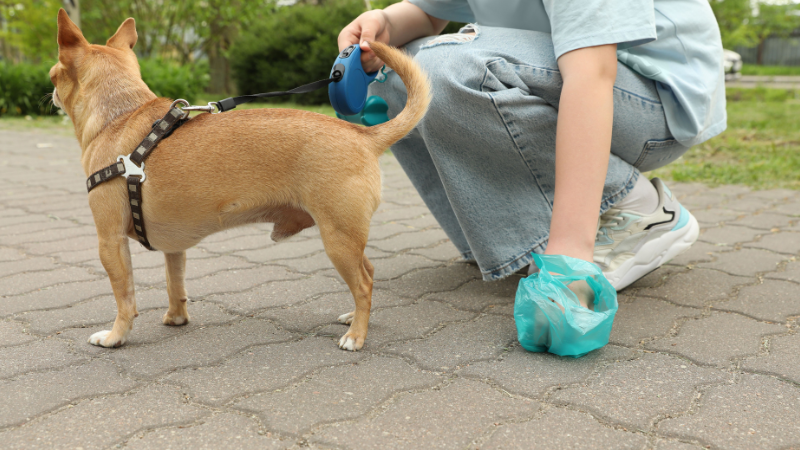
Unveiling the Natural Breakdown: The Biodegradability of Dog Poop
Let’s jump right in and tackle the fundamental question: Is a dog’s poop really biodegradable? The short answer is yes, but the story isn’t that straightforward.
The ability of dog feces to biodegrade hinges on various factors, including environmental conditions, weather patterns, and the composition of the feces itself.
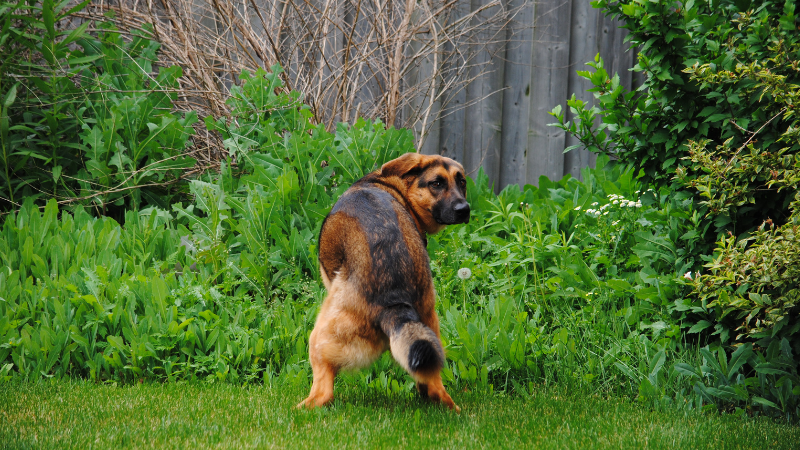
The Advantages of Biodegrading Dog Poop
Let’s take a moment to think about the implications of whether or not dog excrement can fully decompose into harmless substances before we go any further.
This topic has profound implications for our environment and the conscientious pet owners among us.
- Environmental Stability: The process of biodegradation of dog feces helps to maintain ecological stability by lowering the amount of waste that must be disposed of in landfills. It’s a baby step in the right direction toward preserving the fragile balance of the natural world we live in.
- Enhanced Ecosystems: The discharge of contaminants into the soil and water systems can be reduced by properly disposing of dog excrement and allowing it to decompose naturally. This has a beneficial effect on the local flora and animals.
- Reduced Plastic Waste: By encouraging biodegradation, we can potentially lessen our reliance on single-use plastic bags/regular plastic bags, which are often used to collect and dispose of dog feces.
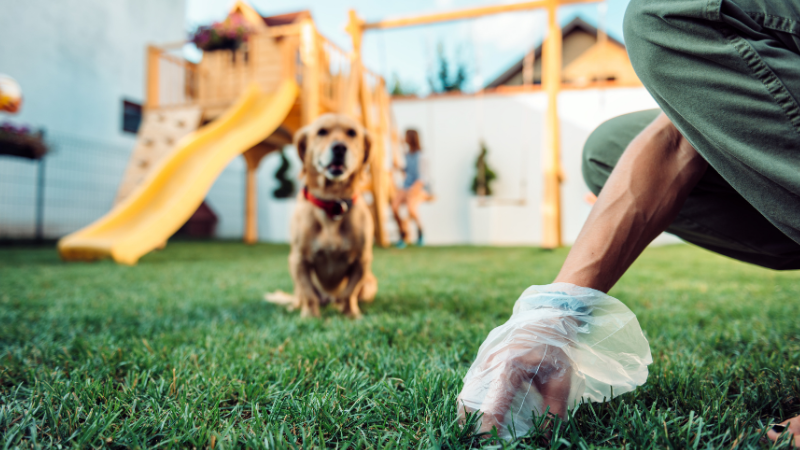
Exploring Pathways to Biodegrade Dog Waste
Now, let’s dive into the nitty-gritty details—how does a dog’s waste and poop break down naturally? There are a few avenues to explore:
- Composting: Some environmentally-conscious individuals opt for composting dog feces. Dedicated composting systems make it easier for trash to be broken down and transformed into nutrient-dense, compost, that may be used on plants that are not edible. Compostable dog poop bags are usually used to carry out composting process.
- Burial: Burying dog feces in a deep hole away from water sources can expedite the biodegradation process. Nonetheless, in order to avoid contamination, this strategy calls for a great deal of thought.
- Biodegradable Bags: When biodegradable bags are made and used for garbage collection, it assures that the waste and the bag itself will decompose over time, reducing the negative effects on the environment over the long run.
Here you can study the end-of-life management of biodegradable recycled materials and plastic dog poop bags through composting of green waste.
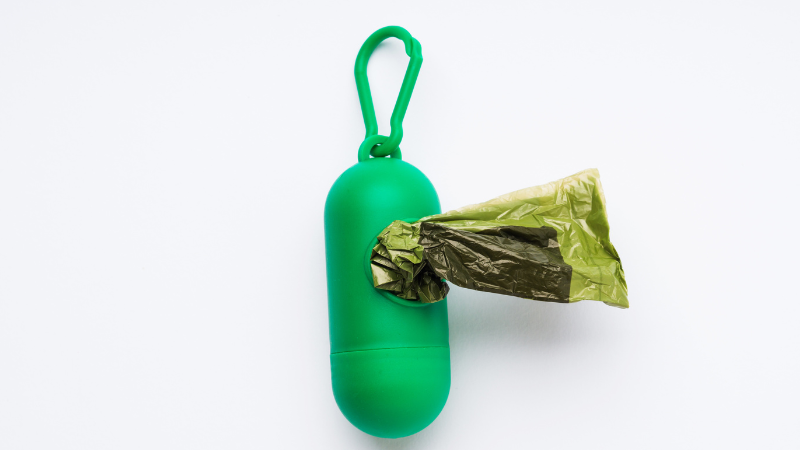
The Step-by-Step Guide to Biodegrading Dog Feces at Home.
Dog poop that decomposes naturally is more responsible for the environment and helps lessen the negative effects of pet and human waste, on our surroundings. The following are some steps that will get you and your furry friends started:
- Choose Biodegradable Bags: Choose plastic poop bags that are biodegradable and produced from materials such as cornstarch, vegetable-based polymers, or other eco-friendly materials instead of traditional plastic bags. These bags decompose more quickly than the conventional types of plastic poop bags do.
- Select a Suitable Composting Method: Try to select a proper method of biodegrading such as the following:
- Backyard Composting: If you have a yard, you can compost dog feces in a dedicated compost pile or bin. However, avoid using the resulting compost on edible plants due to potential pathogens.
- Pet Waste Composting Systems/Industrial Composting Facility: Some companies offer specialized composting systems designed to break down dog feces. These systems manage the dog’s waste more effectively and prevent contamination.
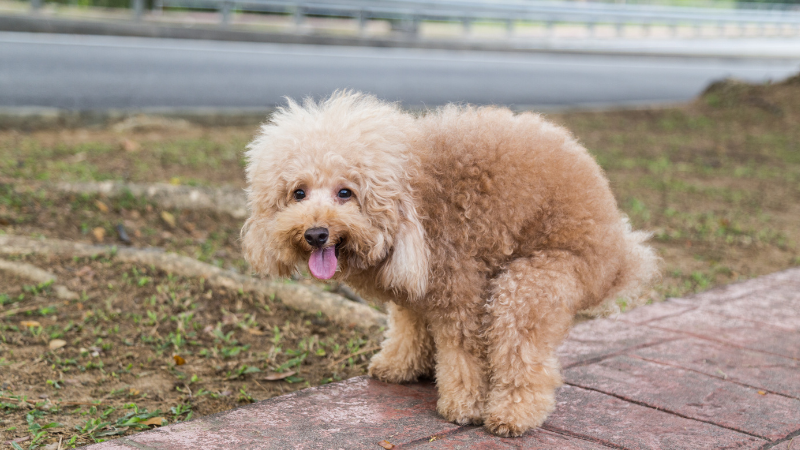
- Designate a Digester: If you’re unable to compost, consider installing a pet waste digester in your yard. This device breaks down waste using natural enzymes, reducing odor and harmful effects.
- Follow Guidelines: Whether composting or using a digester, follow the manufacturer’s guidelines or local regulations. This ensures proper decomposition and prevents any negative environmental impact.
- Separate Waste: Keep dog feces separate from your regular and compostable waste bags (also known as earth friendly poop bags). It contains different microorganisms and pathogens that require specific conditions to break down safely.
- Add Carbon-Rich Materials: To aid decomposition, add carbon-rich materials like sawdust, straw, or dry leaves to organic waste in the trash bin or compost bin. This balances the waste’s nitrogen content. Adding carbon-rich materials is a must because not all poop bags are made equally.
- Regular Maintenance: Stir or turn the compost regularly to encourage aeration and help the waste break down more efficiently. Follow maintenance routines suggested by the composting method you’re using.
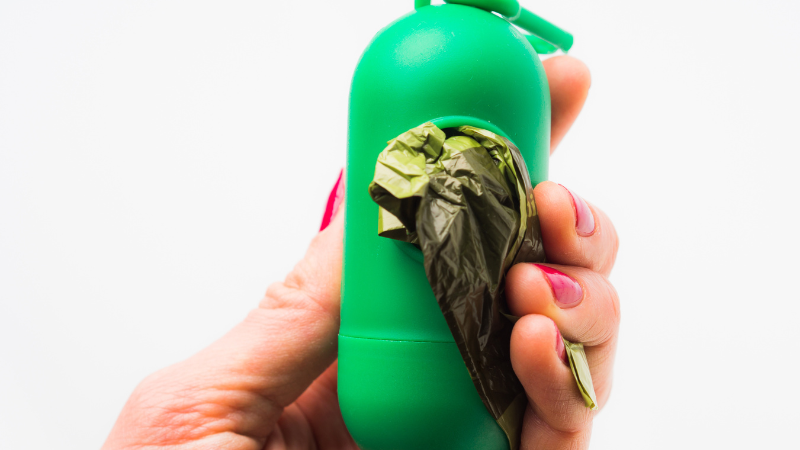
- Avoid Flushing: While it might seem convenient, avoid flushing dog feces down the toilet. Many wastewater treatment plants are not equipped to handle the pathogens present in pet waste.
- Educate Yourself: Research local regulations and guidelines for composting or disposing of pet waste. Some areas have specific rules due to potential water pollution concerns.
- Consider Professional Services: If managing pet waste at home isn’t feasible, look for local services that collect and process pet waste using environmentally friendly methods.
Comparative Analysis: Dog Poop vs. Other Biodegradable Matter
Let’s don our analytical hats and compare the biodegradability of dog feces to that of other commonplace items:
Visualizing the Data: A Comparative Biodegradation Times Table
Biodegradation Time Range
- Banana Peel: 2-5 weeks
- Paper: 2-5 months
- Dog Feces/Poop: 1 month – 1 year
- Cotton Fabric: 1-5 months
Quenching Curiosity: Addressing Common Questions
Let’s shift our focus to some pressing concerns that frequently come up when thinking about the biodegradability of plastic dog poop bags.
Here you can study everything about what you must not do with biodegradable dog poop bags.
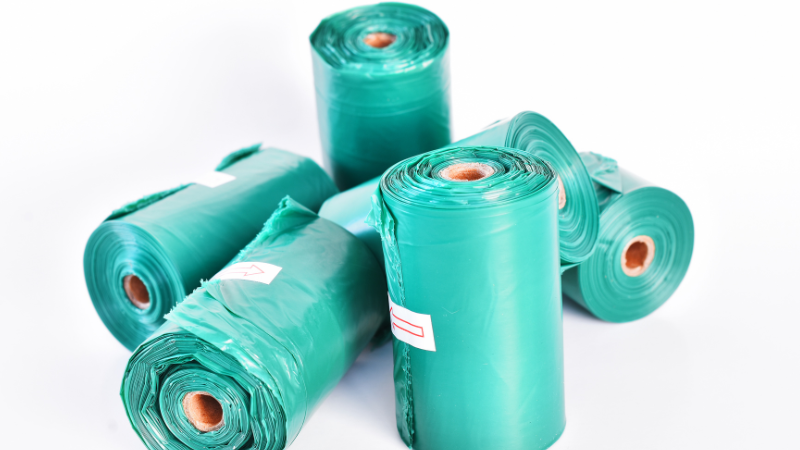
Are biodegradable poop bags efficient? Answer the question
Yes, biodegradable poop bags can be considered efficient to your carbon footprint to some extent. These compostable bags are designed to break down more quickly than traditional plastic bags, which can take hundreds of years to decompose. Biodegradable poop bags are typically made from materials that are meant to degrade more rapidly, reducing the long-term environmental impact.
However, the efficiency of biodegradable poop bags/biodegradable bags can vary depending on factors such as the specific material they are made from, the conditions of the environment they are disposed in, and the presence of oxygen and microorganisms required for proper decomposition.
In ideal conditions, biodegradable dog poop bags can eventually break down within a few months to a couple of years, which is significantly faster than traditional plastic bags. Also, these special dog waste bags collect and dispose of dog’s poop efficiently and reduce the work load or stress of dog owners.
Does Dog Feces Dissolve in Rain?
Due to the high water content in compost dog poop bags, it is possible for dog compostable poop bags not to decompose when it is exposed to rain partially.
Nevertheless, this does not necessarily suggest that the substance has completely biodegraded; it may be breaking down into smaller and smaller particles.
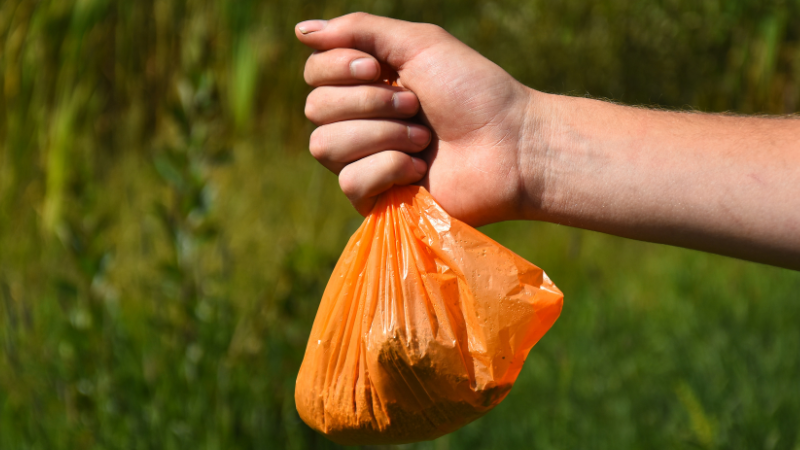
How Long Does it Take for Dog Feces to Biodegrade?
The amount of time necessary for the biodegradation of dog poop varies depending on a number of parameters including temperature, moisture content, and the makeup of the waste.
The procedure might take anything from one week to one year on average to complete.
Can Dog Poop Serve as Fertilizer?
Even while it does contain certain nutrients, it is not advised that dog poop be used as fertilizer for edible plants because of the potential for adverse health effects.
After going through the right home compost-ing dog waste process, it is in a better position to make compostable be used on un edible plants.
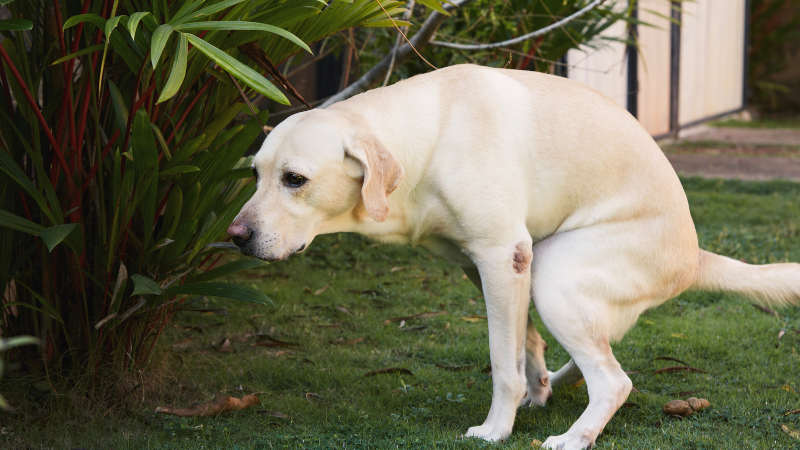
What Influences the Speed of Dog Feces Decomposition?
The same factors that impact the rate of biodegradation also govern the rate at which matter decomposes.
The plastic garbage could degrade in a matter of months if the water supply and conditions are just right; but, if the conditions aren’t quite right, the process might take a substantial amount of time longer.
The top quality compostable dog poop bags are always recommended for composting dog waste.
Concluding Our Exploration of Biodegradable Dog Feces/Poop
Our journey toward biodegradable materials has finally led us to its logical conclusion. When it comes to the issue of biodegradability, the seemingly simple matter of dog poop reveals its many-layered complexity.
Remember the significance of practicing proper waste management as you enjoy the great outdoors with your faithful friend. Whether through composting, in-ground disposal, or the use of environmentally friendly compostable bags/dog poop bags only, the journey of dog waste’s biodegradation holds profound implications beyond the surface.
